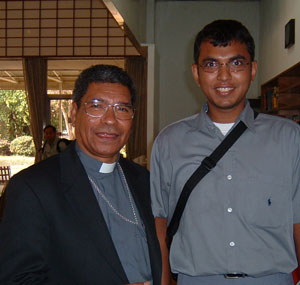Carlos Felipe Ximenes Belo
|
|
Carlos Felipe Ximenes Belo (born February 3, 1948) is a Roman Catholic bishop who received, together with José Ramos Horta, the 1996 Nobel Peace Prize, for their work "towards a just and peaceful solution to the conflict in East Timor".
The fifth child of Domingos Vaz Filipe and Ermelinda Baptista Filipe, Carlos Felipe Ximenes Belo was born in the village of Wailakama, near Vemasse, on the north coast of East Timor. His father, a schoolteacher, died two years later. His childhood years were spent in Catholic schools at Baucau and Ossu, before he proceeded to the Dare minor seminary, outside Dili, from which he graduated in 1968. From 1969 until 1981, apart from periods of practical training (1974-1976) back in East Timor and in Macau, he was in Portugal and Rome where, having become a member of the Salesian Society, he studied philosophy and theology before being ordained a priest in 1980.
Returning to East Timor in July 1981 he became a teacher for 20 months, then Director for two months, at the Salesian College at Fatumaca. On the resignation of Martinho da Costa Lopes in 1983, Carlos Filipe Ximenes Belo was appointed Apostolic Administrator of the Dili diocese, becoming head of the East Timor church and directly responsible to the Pope. In 1988 he was consecrated a Bishop (of Lorium, Italy).
Father Belo was the choice of the Vatican's Pro Nuncio in Jakarta and the Indonesian leaders because of his supposed submissiveness, but he was not the choice of the Timorese priests who did not attend his inauguration. However within only five months of his assuming office he protested vehemently, in a sermon in the cathedral, against the brutalities of the Kraras massacre (1983) and condemned the many Indonesian arrests. The church was the only institution capable of communicating with the outside world, so with this in mind the new Apostolic Administrator started writing letters and building up overseas contacts, in spite of the isolation arising from the opposition of the Indonesians and the disinterest of most of the world and the Catholic Church.
In February 1989 he wrote to the President of Portugal, the Pope, and the UN Secretary-General, calling for a UN referendum on the future of East Timor and for international help for the East Timorese, who were "dying as a people and a nation", but when the UN letter became public in April, he became even more of a target of the Indonesians. This precariousness increased when Bishop Belo gave sanctuary in his own home, as he did on various occasions, to youths escaping the Santa Cruz massacre (1991), and endeavoured to expose the numbers of victims killed.
Bishop Belo's courageous labours on behalf of the East Timorese and in pursuit of peace and reconciliation were internationally recognised when, along with José Ramos Horta, he was awarded the Nobel Peace Prize in December 1996. Bishop Belo capitalised upon this honour through meetings with Bill Clinton of the United States and Nelson Mandela of South Africa.
In the aftermath of East Timorese independence on 20 May 2002, the pressure of events and the ongoing stress he endured began to show their effects on Bishop Belo's health. Pope John Paul II accepted his resignation as Vicar Apostolic of Dili on November 26, 2002.
Following his resignation as Vicar Apostolic, Bishop Belo traveled to Portugal for medicial treatment. By the beginning of 2004, there were repeated calls for him to return to East Timor and to run for the office of president. However, in May 2004 he told Portuguese state-run television RTP, that he would not allow his name to be put up for nomination. "I have decided to leave politics to politicians," he stated. One month later, on June 7, 2004, Pascuál Chavez, rector major of the Salesian Society, announced from Rome that Bishop Belo, returned to health, would take up a new assignment. In agreement with the Holy See, he would go to Mozambique as a missionary, and live as a member of the Salesian Society in that country.
In a statement released on June 8, Bishop Belo explained: "Following two meetings in 2003 and in 2004 with His Eminence the Prefect of the Congregation for the Evangelization of Peoples, I am offering myself to serve the Kingdom of God on the Missions, outside East-Timor, in Mozambique, more precisely in the Diocese of Maputo. To go on the missions was a dream that I always had during the years of my youth. Also during the 19 years of my episcopal ministry in Dili (1983-2002), one of the subjects I spoke about most was that of the missions and the need to be missionaries. Today has come the time to put into practice what I said to the Christians of East-Timor."
By July 2004, Bishop Belo had taken up his missionary work in Maputo, Mozambique.bg:Карлуш Фелипе Хименес Белу ca:Carlos Felipe Ximenes Belo de:Carlos Felipe Ximenes Belo id:Carlos Felipe Ximenes Belo ja:カルロス・フィリペ・シメネス・ベロ minnan:Carlos Felipe Ximenes Belo pl:Carlos Felipe Ximenes Belo pt:Carlos Felipe Ximenes Belo

